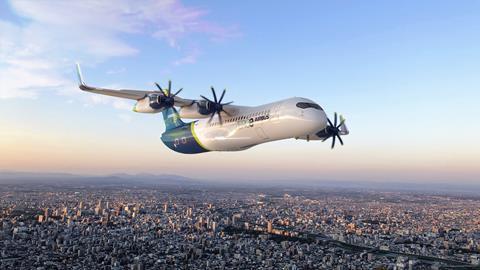Airbus and MTU Aero Engines are to unite their hydrogen fuel cell powertrain research efforts through a newly unveiled pact.
Detailed in a memorandum of understanding (MoU) signed at the Paris air show on 18 June, the agreement sees the two companies adopt a three-stage roadmap for the development.

As a first step, the pair will mature the “the technological building blocks” needed for a fuel cell-powered engine through joint research projects, such as those in the EU’s Clean Aviation initiative.
But a second phase will see the partners “aligning” their separate research and technology priorities for hydrogen technology.
“The result of these joint explorations then would allow us to consider a third step towards the development of a fuel-cell engine for a hydrogen-powered aircraft,” says Airbus.
“Collaborating with MTU, a leader in engine manufacturing and innovation, is a perfect complement to our own advancements,” says Bruno Fichefeux, head of future programmes at Airbus.
“This partnership will allow us to pool our collective knowledge, accelerate the maturation of critical technologies, and ultimately deliver a revolutionary hydrogen-powered propulsion system for future commercial aircraft.”
Airbus has been developing a 1.2MW-class fuel cell powertrain through its ZEROe programme but earlier this year ditched plans to take the system to flight test following a slowing of its hydrogen research activities and a delay to service entry of its ZEROe aircraft.
MTU has also been working on what it calls the Flying Fuel Cell, a 600kW-rated powertrain and a related Clean Aviation-backed project for a 1.2MW system.
“Partnering with Airbus opens up the possibility to jointly address both technology maturity and platform integration aspects,” says Dr Stefan Weber, senior vice-president of engineering and technology at MTU.
“Our joint efforts in the years to come are the first step in paving the way for a potential product development in the future.”































